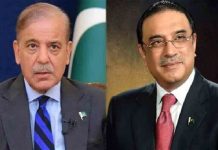By Uzma Zafar
ISLAMABAD: Chief Justice of Pakistan Umar Ata Bandial formed on Tuesday a five-member larger bench – selecting a judge from each province – to hear the Presidential Reference filed by the federal government seeking an opinion on Article 63(A) as well as a petition filed by the Supreme Court Bar Association (SCBA) regarding the SC’s insurance of law and order ahead of the no-confidence vote.
According to the written order of the apex court’s hearing held on Monday, the SCBA’s counsel, as well as the opposition parties’ counsel, expressed “strong reservations and concerns” that the National Assembly Speaker summoned the NA session for the no-confidence motion on March 25, which was beyond the stipulated 14 days period.
However, the court maintained that it was not “not inclined to take up this matter as it is collateral to the questions of constitutional interpretation raised before the Court”, including the reference filed by President Dr Arif Alvi It furthered that for such matters the Constitution “envisages a remedy before Parliament itself”.
The Attorney General of Pakistan made a “categorical statement” before the Court that the federal government would not “hinder or obstruct, or interfere with” any members of the NA (including those of PTI) who wish to attend the no-confidence motion session, and to participate in, and cast their votes, on the resolution.
Regarding the “grave concerns” expressed about political rallies in Islamabad and the influx of supporters into the federal capital and especially in the Red Zone, the AGP suggested that representatives of the political parties sit with Islamabad’s administration and work out a mechanism to the holding of rallies, as well as their days and venues.
The apex court dubbed this a reasonable and practical suggestion.
The written order stated that counsel for various political parties accepted the suggestion, but highlighted that the counsel for PPP, PML-N and JUI-F have expressed reservations as to “whether any fruitful outcome will be achieved”.
However, the order said that the counsel maintained that “good faith effort” would be made by all.
The SC directed the AGP to coordinate with the political parties’ counsel to arrange the meetings with the administration on an urgent basis as suggested by him.
The court stated that the Inspector General of Police Islamabad had filed a report in relation to the incident at the Sindh House – wherein PTI workers stormed the House which housed dissident PTI lawmakers.
The SC was also apprised of the strict measures being taken to avoid any repetition of the incident anywhere in the Red Zone in relation to the moving and voting upon of the no-confidence motion.
“The IG states that the FIR already registered will be vigorously pursued in accordance with law,” the order said, adding that the Advocate General Sindh desired for the province’s version to be put on record.
The AG Islamabad assured the court that any representation made by Sindh through the AG would be dealt with in accordance with the law.
The court stated that the concerns expressed by Advocate General Sindh “must be addressed and action taken in accordance with law”.
The order stated that the court was cognizant that the matter was time-constrained and directed all counsel to file concise statements of their submissions by or before March 24, so that the oral hearing could be “completed within an acceptable timeframe”.
SCBA petition
Earlier this week, a special bench of the apex court – comprising CJP Umar Ata Bandial and Justice Munib Akhtar – heard the SCBA petition, seeking direction to all state functionaries to act strictly in accordance with the Constitution and the law considering the no-trust vote against the premier.
SCBA President Muhammad Ahsan Bhoon had filed the petition regarding ‘restraining political parties from holding public meetings in Islamabad before voting on the no-confidence motion’.
The petition prayed on the apex court to direct the National Assembly speaker to carry out the process of no-confidence motion according to the Constitution and further requested the SC to prevent state agencies from arresting or detaining MNAs and to stop public gatherings in the federal capital which prevented the assembly members from reaching the Parliament.
Presidential reference
The Supreme Court on Monday formed a larger bench to hear a presidential reference through which President Dr Arif Alvi has sought the court’s opinion on Article 63(A) of the Constitution.
The article deals with the disqualification of parliamentarians over defection.
The reference was submitted by the Attorney General of Pakistan Khalid Jawed Khan. The court issued notices to all major parties on the presidential reference as a larger bench would be expected.
Through the reference, the government has sought the apex court’s advisory on the measures and steps to be “taken with an existing constitutional and legal framework to curb, deter and eradicate the cancerous practice of defection, floor crossing and vote-buying”.
Joint hearing
In the apex court’s written order, it stated that the two matters would be heard together.
“For this purpose notice is issued to the petitioner SCBA. Notices are also issued in relation to the Reference to the political parties who are before us in terms of our previous order”.



